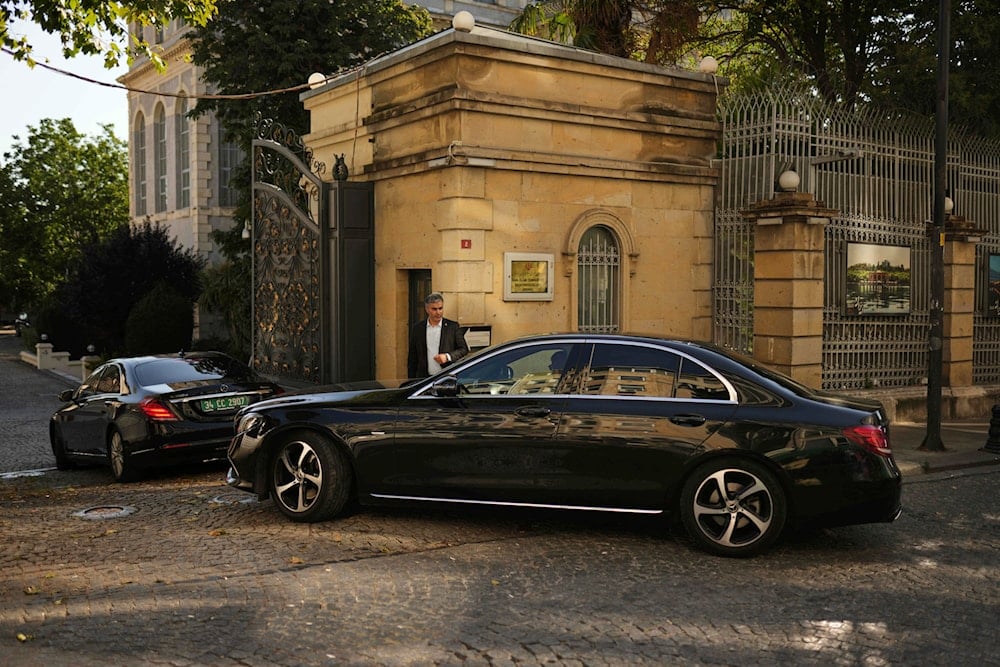Iran holds nuclear talks with E3 amid snapback sanctions threat
Iran meets with European powers in Istanbul as the threat of snapback sanctions looms.
-

Cars, which are believed to carry European diplomats, enter the Iranian consulate ahead of a meeting with Iranian counterparts for talks over Tehran's nuclear program, in Istanbul, Turkey, on July 25, 2025. (AP Photo/Francisco Seco)
Iranian diplomats met with representatives from Germany, France, and Britain in Istanbul on Friday for the first nuclear talks since "Israel’s" June war on Iran. The meeting comes as European powers weigh whether to trigger "snapback" sanctions under the 2015 nuclear deal, a move Tehran has warned could carry serious consequences.
The meeting took place at the Iranian consulate and lasted several hours, with European diplomats seen leaving the premises shortly before 2:00 p.m. local time. Neither side issued an immediate statement about the outcome of the discussions.
دکتر تخت روانچی و من گفتگویی جدی، صریح و مفصل با مدیران سیاسی سه کشور اروپایی/اتحادیه اروپا داشتیم. آخرین تحولات مربوط به لغو تحریمها و موضوع هستهای مورد بحث و بررسی قرار گرفت. ضمن انتقاد جدی از مواضع آنها در مورد جنگ تجاوزکارانه اخیر علیه مردم ما، مواضع اصولی خود، از جمله در…
— Gharibabadi (@Gharibabadi) July 25, 2025
This was the first direct engagement between Tehran and the so-called E3 since the 12-day war triggered by "Israel’s" mid-June airstrikes on Iranian military and nuclear facilities. Those attacks, which resulted in the deaths of top scientists and commanders, also delayed a sixth round of US-Iran nuclear negotiations scheduled for June 15.
On June 22, the United States joined the offensive with coordinated strikes on nuclear sites in Fordo, Isfahan, and Natanz. Iran has since suspended cooperation with the International Atomic Energy Agency, accusing it of bias and inaction over the attacks.
Snapback sanctions deadline looms as Europe presses Iran
The E3 powers have threatened to invoke the snapback mechanism, which would restore UN sanctions lifted under the 2015 Joint Comprehensive Plan of Action (JCPOA). That option remains available until October, with a decision expected by the end of August.
"Inaction by the E3 is not an option," a European diplomatic source said, according to AFP, warning Tehran that time was running out to reach a compromise. The source noted that the Europeans are prepared to trigger sanctions "in the absence of a negotiated solution" and urged Iran to demonstrate "flexibility" on uranium enrichment and IAEA cooperation.
Iran’s Deputy Foreign Minister Kazem Gharibabadi, who attended Friday’s meeting alongside senior diplomat Majid Takht-Ravanchi, said that reimposing sanctions would be "completely illegal." He accused the European parties of abandoning their obligations under the JCPOA after the US withdrawal in 2018.
"We have warned them of the risks, but we are still seeking common ground to manage the situation," Gharibabadi said. Tehran has previously indicated it could leave the nuclear non-proliferation treaty if snapback sanctions are restored.
Foreign Minister Abbas Araghchi reaffirmed Iran’s stance on enrichment, declaring, "Iran's position remains unshakable, and our uranium enrichment will continue." He added that enrichment had only been temporarily paused due to the extensive damage caused by US and Israeli strikes.
Israeli and US attacks derail diplomacy, escalate tensions
Israeli Foreign Minister Gideon Saar has publicly called on the E3 to trigger snapback sanctions, while Iran has pledged a "harsh response" to any future attacks or further diplomatic isolation.
In the wake of the war, Tehran halted its cooperation with the IAEA, stating the agency had failed to condemn "Israel’s" actions, and the agency's inspectors left the country shortly afterward.
According to Iranian officials, future engagement with the nuclear watchdog will take a “new form,” with a technical delegation expected to return in the coming weeks to discuss the next steps.

 3 Min Read
3 Min Read










